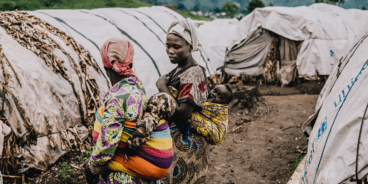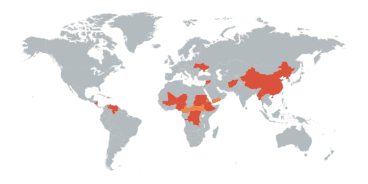
Atrocity Alert No. 55: Yemen, Central African Republic and Syria
Atrocity Alert is a weekly publication by the Global Centre for the Responsibility to Protect highlighting and updating situations where populations are at risk of, or are enduring, mass atrocity crimes.
Yemen
On 15 May the International Committee of the Red Cross announced that a cholera outbreak in Yemen has killed 184 people since 27 April. More than 11,000 suspected cases of the disease were reported in 18 governorates across the country. According to the World Health Organization (WHO), 7.6 million people are now at risk of exposure to cholera, with those displaced and starving as a result of the ongoing conflict amongst the most vulnerable.
Since March 2015 more than 3.1 million Yemenis have been forcibly displaced, and 14.4 million people lack access to safe drinking water. The destruction of civilian infrastructure has exacerbated the latest cholera outbreak and diminished the capacity of health workers to respond. WHO has reported that nearly 300 hospitals and clinics have been damaged or destroyed, many by airstrikes and shelling. Less than 45 percent of medical facilities in Yemen are still fully functioning.
On 19 May United States President Donald Trump will visit Saudi Arabia. In 2016 Saudi Arabia purchased approximately $1.9 billion worth of US-made weapons, more than any other country in the world. US-made weaponry has been used extensively by the Saudi-led coalition in their war against Houthi rebels in Yemen. During his visit President Trump should emphasize that Saudi Arabia must consistently uphold its obligations under international humanitarian law. All attacks on healthcare facilities and health workers should be impartially investigated and the perpetrators held accountable.
The UN Secretary-General should publicly list those states, and non-state armed groups, that deliberately target healthcare during armed conflict.
Central African Republic
After months of relative calm, the security situation in the Central African Republic (CAR) is rapidly deteriorating, including in areas previously unaffected by large-scale violence. On 12 and 13 May suspected anti-balaka fighters coordinated an attack on the mainly Muslim neighborhood of Tokoyo in Bangassou, the capital of Mbomou prefecture. At least 115 people were killed and more than 7,000 fled their homes. In Bria, the capital of Haute-Kotto prefecture, and in Alindao, Basse-Kotto, clashes between an anti-balaka militia and elements of the former Seleka rebel group have also displaced thousands of people.
There have also been several recent deadly attacks on the UN Multidimensional Integrated Stabilization Mission in CAR (MINUSCA), with six peacekeepers being killed over the course of a week. The UN Security Council condemned recent violence in Bangassou, emphasizing that “attacks against peacekeepers may constitute war crimes.” The UN High Commissioner for Human Rights, Zeid Ra’ad Al Hussein, also expressed grave alarm over “the increase in targeted killings of civilians,” especially regarding recent attacks directed against the minority Muslim population and ethnic Fulani.
Sustainable peace in CAR is not possible without accountability for past atrocities and halting ongoing violence by various non-state armed groups. The international community must work with the CAR government to expeditiously establish the Special Criminal Court and support MINUSCA’s efforts to protect civilians.
Syria
In February 2017 Amnesty International reported that the Syrian government had systematically disappeared, tortured and extrajudicially executed thousands of prisoners at Saydnaya military prison, on the outskirts of Damascus. On 15 May the United States government revealed satellite intelligence that allegedly shows the Syrian government constructing and utilizing a crematorium to dispose of the remains of thousands of executed prisoners at Saydnaya. Acting US Assistant Secretary of State Stuart Jones described this as a deliberate effort by the Syrian government “to cover up the extent of mass murders taking place in Saydnaya prison.”
The Syrian government should immediately allow the UN and relevant humanitarian organizations access to Saydnaya prison.
The widespread and systematic commission of enforced disappearances, torture and extrajudicial executions amounts to war crimes and crimes against humanity. UN member states should fully cooperate with the International, Impartial and Independent Mechanism (IIIM) established by the UN General Assembly to assist in the investigation and prosecution of all perpetrators of atrocities in Syria, regardless of their position or affiliation. The international community should facilitate the work of the IIIM through the provision of voluntary funding and technical assistance.

